Haunted, self-possessed or just spirited: 2022’s Emmy-nominated songs
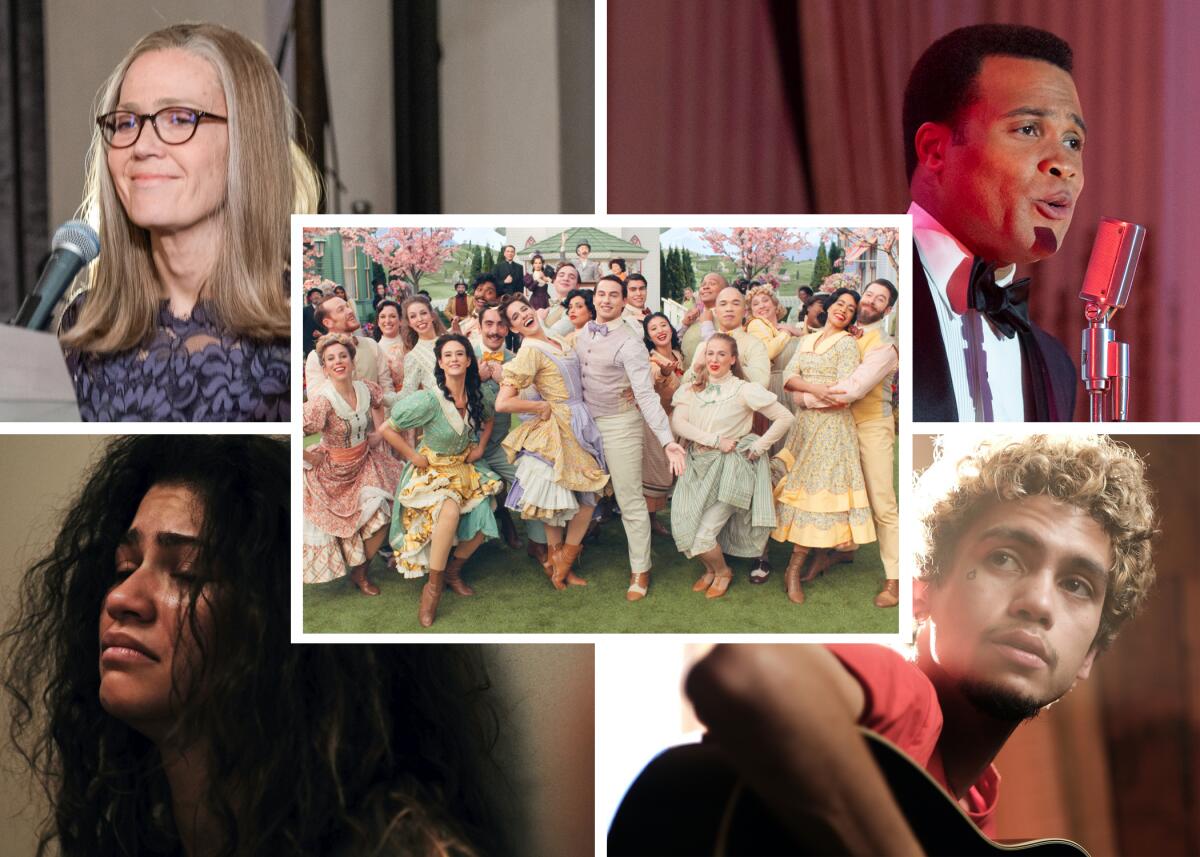
- Share via
The songs nominated for the 2022 Emmy for original music and lyrics are each haunted by something. Some are lively, even wacky homages that resurrect sounds of the past — the grand, old “Oklahoma!”-type musical; a calypso wedding toast delivered by (a fictional version of) Harry Belafonte. One song spiritually guides a young woman off the knife’s edge she has been treading. Another brings its entire series full circle, built on a wisp of a melody that has lingered in the atmosphere for six seasons. And one has roots in both the story’s betrayal in love and a poignant, real-life revelation.
“The Forever Now”
From “This Is Us”; music by Siddhartha Khosla, lyrics by Taylor Goldsmith
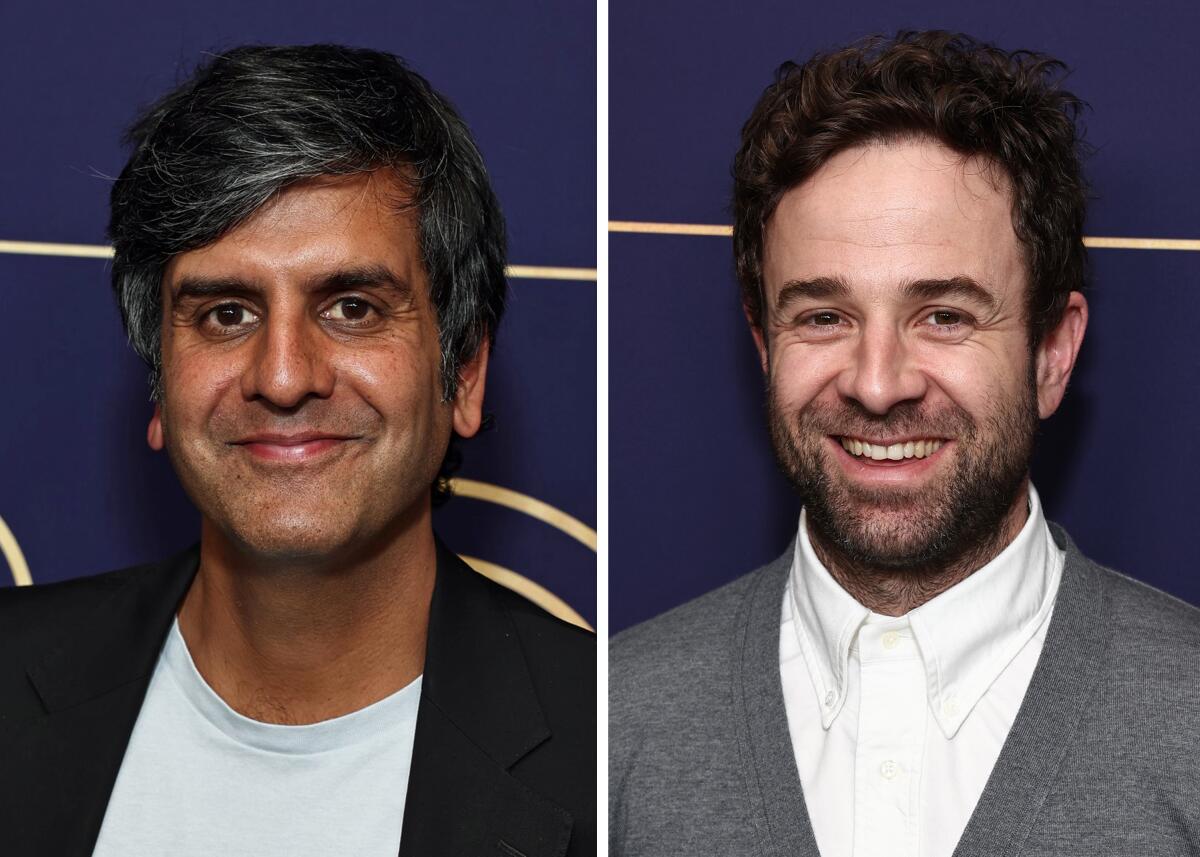
An elderly woman sits at a keyboard at her daughter’s wedding to play a song she wrote. She struggles to remember. She’s suffering from Alzheimer’s. When her fingers do find the notes pulled from deep in her memory, the audience — the millions of fans who’ve watched “This Is Us” for six seasons — suddenly have a similar feeling of realization, of recognition.
“The melodic concept of ‘The Forever Now’ is something that we’ve been sort of teasing along for a while,” says series composer Siddhartha Khosla. “It’s one of the main themes for six seasons. [Series creator] Dan Fogelman had this plan that the melody we’ve been hearing would end up becoming Rebecca’s [Mandy Moore’s] song at Kate’s wedding. Dan’s mandate was ‘Go and write the best song you guys have ever written.’ No pressure.”
Fortunately, Khosla says, his co-writer, Taylor Goldsmith, “has a window into Rebecca in a way that none of us do, because his wife is Mandy Moore.”
Goldsmith, frontman of the band Dawes, has watched the actor-singer work on the character for years, from the earliest stages of receiving scripts, to hashing out moments with her acting coach, to the finished product on the air. (“Also, I’m a massive fan of the show,” he says.)
He says Rebecca is, “for lack of a better phrase, a failed songwriter. She didn’t get to live that dream. So we couldn’t put on our Leonard Cohen hat or something. How do you do it through someone else’s voice” — an admittedly limited songwriter, but perhaps having her finest moment even as she struggles through the gathering fog of dementia?
“How do you speak to these themes that the show’s been touching on this whole time that she’s not realizing she’s touching on? It’s a Friday crossword instead of a Monday crossword,” says Goldsmith, and both men laugh.
Goldsmith says the title idea of “The Forever Now” came right away — an expression of perhaps the essence of “This Is Us”: the past’s constant presence, reinforced by the show’s time-jumping narrative. It was the rest that took some time. He and Khosla went back and forth, looking for the first verse. Then he found the opening line: “They say time will tell, but I think it likes to keep secrets.”
“I don’t know where that line came from, but once it showed up, then it was just like cooking with gas,” Goldsmith says.
They were soon ready to record a polished version with Moore at the top of her vocal powers. It went to No. 1 on iTunes. Then, for the performance in the show in which the 38-year-old Moore is in character as the 70-something Rebecca, they dropped the key a half-step at the singer’s urging.
“We created an alternate version where the piano chords were simpler, for someone who’s not too skilled on piano. At first she’s fumbling trying to remember it, but once she does, she’s locked in,” says Khosla. “She’s able to transcend her predicament and be a force of strength. It’s what makes Rebecca this superhero for the family.”
Goldsmith, having just returned from touring with Moore (they had to cut the tour short due to her pregnancy), says the singer made the song her final encore in the concerts. “We would play it every night and the fans treated it like one of the biggest songs she’s ever had. The eyes would go wide and they’d cheer at the first line. They sang along to every word.”
“Maybe Monica”
From “The Marvelous Mrs. Maisel”; music and lyrics by Thomas Mizer and Curtis Moore
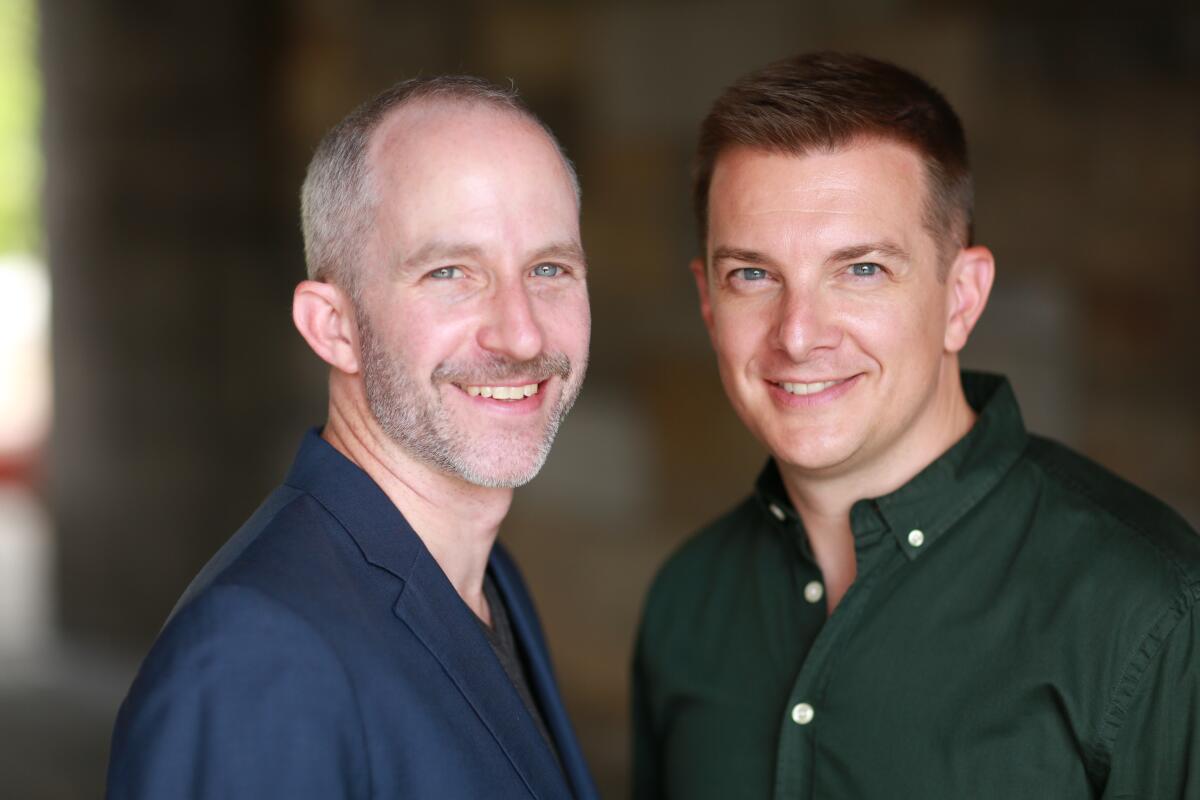
“The Marvelous Mrs. Maisel’s” songwriting team of Curtis Moore and Thomas Mizer is used to getting requests from showrunner Amy Sherman-Palladino to tailor songs to a particular late ‘50s/early ‘60s genre. She managed to throw them for a loop, however, with her marching orders for “Maybe Monica.”
“Amy will call up and be like, ‘Uh, Harry Belafonte’s gonna sing at Shy’s wedding. Go!’ And then she’ll hang up,” says Mizer, laughing.
Legendary entertainer and civil rights icon Belafonte is, in the world of “Mrs. Maisel,” a friend of supporting character Shy Baldwin (a closeted crooner who has a complicated relationship with protagonist Midge).
Moore’s first reaction: “Are we being punked? He’s got a thousand amazing songs already. Why wouldn’t he be singing” one of those?
The two say they were stymied by the thought of writing a new song for the fictional Belafonte instead of simply using one of his many real hits until Sherman-Palladino gave them a key note: It was to be a wedding toast.
“Ah! Story!” exclaims Mizer. “Suddenly that was the reason for us to be writing this.”
“Now we could have fun with it on two levels,” Moore says. “One, Harry’s writing this jab, this fun little joke song to Shy about, ‘How’d you get that great girl to marry you?’ Because I don’t think Harry necessarily knows the entire backstory of Shy Baldwin. But we as writers know, and you as the audience know, so that allows us another level to write that into the song. This is a sham wedding! This is a publicity stunt.”
Lyricist Mizer says, “At the same time, it’s the question we should be asking the whole episode. ‘Why is Monica [marrying him]?’
“My favorite thing in it is just that I made the singer have to do ‘Baby made a Maybe a Yes’ over and over again: ‘Baby made a Maybe a Yes / Baby made a Maybe a Yes.’ Everybody on set was trying to say it three times fast.”
Curtis says, “It all ends up a fun play on this moment, but also, ‘What is this farce that’s happening in front of us?’ And of course, we’re trying to show that while still having a joyous, fun, Harry Belafonte calypso number.”
“I’m Tired”
From “Euphoria”; music and lyrics by Labrinth; lyrics by Sam Levinson and Zendaya
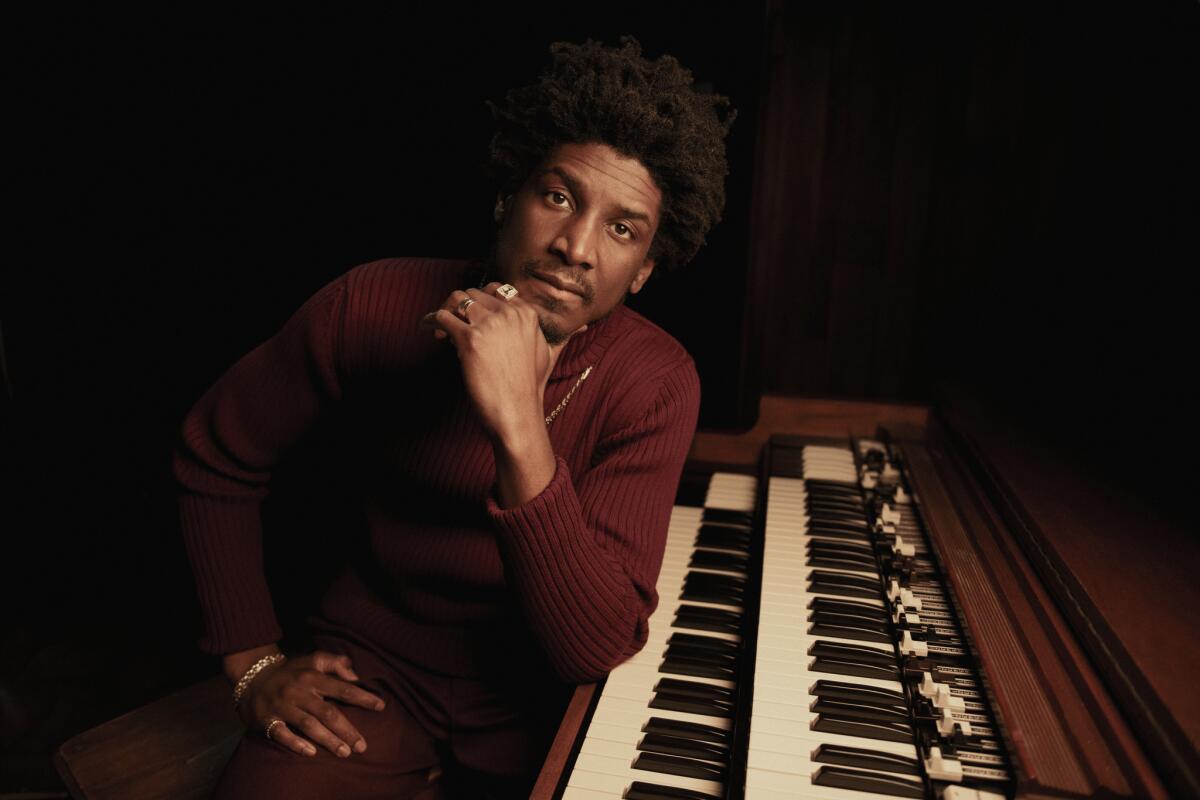
“Euphoria” protagonist Rue (Zendaya) goes through hell on the show. She plummets in a spiral of addiction and betrayal until realizing she has to stop her descent.
“When you get to that place where you’ve gone around in circles so many times, there’s this tiredness in your soul. It’s not just tiredness physically,” says series composer Labrinth of the gospel-inflected “I’m Tired.”
“I just started singing it and then [series creator Sam Levinson] started writing lyrics to some of my melodies and Zendaya would say something; it was like us playing tennis in the studio.”
The simple, repeated lines feel like a mantra (“Hey, Lord, you know I’m tired” and “Hey, Lord, you know I’m trying”) that bends toward darkness (“I’m sure this world is done with me”). But in its naked plea, it comes around to “Hey, Lord, I wanna stay.” The vocalist for most of it is male, though the words could come directly from Rue’s heart.
“It could sound suicidal if a person listened to it very little, but for me, the end of the old you is the beginning of a new you. What we’re saying is we wanna renew ourselves.”
One might expect some hints of Kirk Franklin in Labrinth’s inspiration for a gospel song, or Prince, and he says both were in the mix. He also cites Kanye West, Queen and Nat “King” Cole as resonating in his head as he wrote.
“They all have this ethereal, kind of spiritual energy. When I was listening to Queen, those big harmonies take you somewhere. Nat “King” Cole, his ballads can have harmonies that feel like they morph into other universes and then return.”
In the show, Rue staggers into a church, where we realize the song is coming from a familiar-looking gospel singer who embraces the spiritually battered girl.
“I was a bit nervous because I hadn’t performed for a while,” Labrinth says of finally fulfilling Levinson’s request that he cameo on the show. “Then the whole church, everyone was crying. Me and Zendaya cried. We were all in tears together.”
“Corn Puddin’ “
“Schmigadoon!”; music and lyrics by Cinco Paul
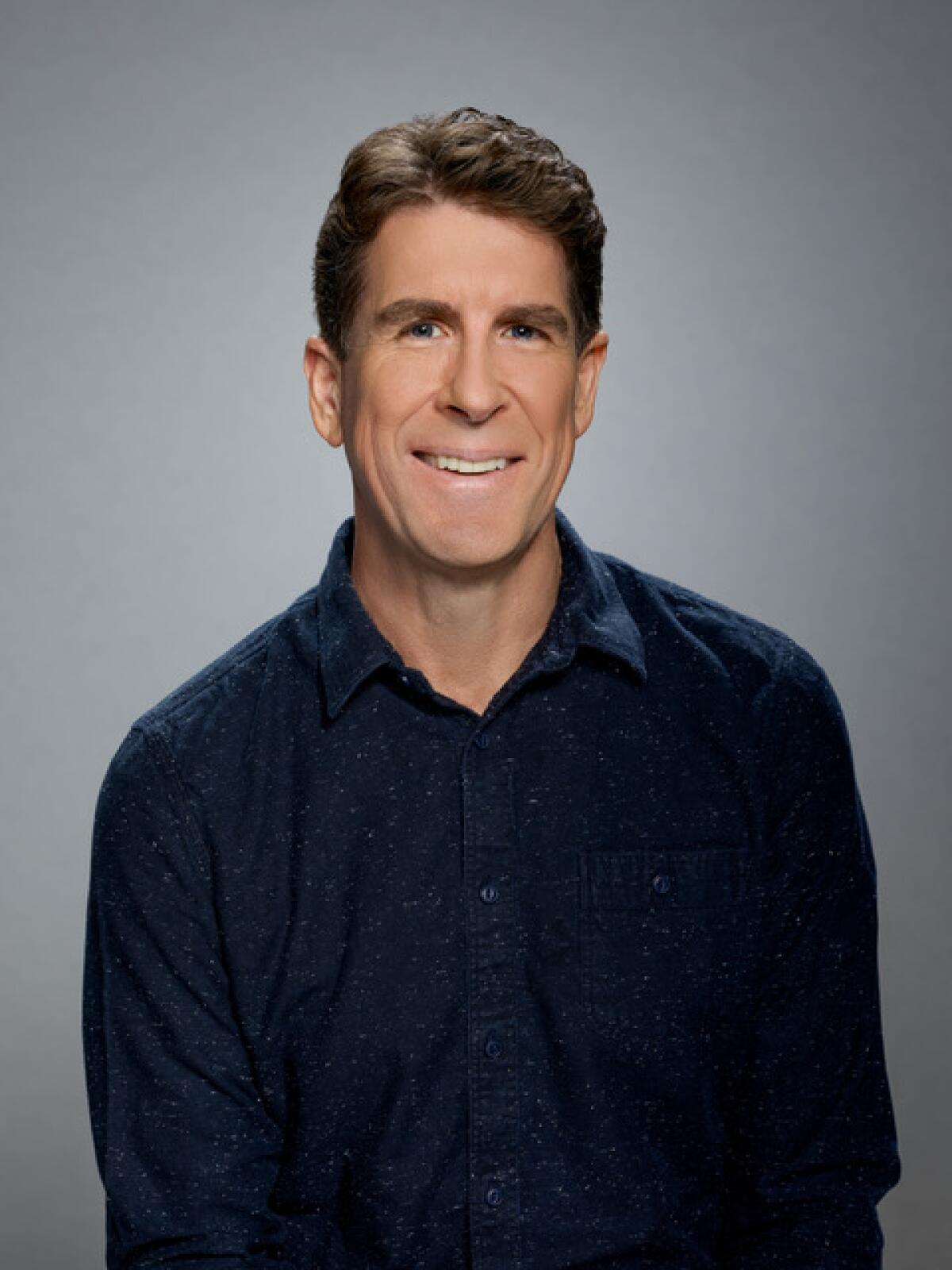
In “Schmigadoon!,” a couple on the rocks (played by Keegan-Michael Key and Cecily Strong) find themselves in a suspiciously quaint hamlet whose denizens have a habit of launching into well-coordinated musical numbers. The two haven’t realized they’re trapped in a bizarre musical-theater limbo when Strong’s character says she has never tried the place’s famous corn pudding and the whole gosh darn town turns up to sing and dance its praises.
There’s a side helping of smiley innuendo with this “Corn Puddin’ “: “If he wants my puddin’,” brightly sing the ladies, “he’ll have to marry me.” And several of the female dancers end in inverted splits, held up by male dancers. It’s a regular horny-on-the-down-low hootenanny, a subtle foreshadowing of the repression beneath the shiny surface.
“Ken and I would sing that song to whoever we were pitching the show,” says co-creator and series composer Cinco Paul, known for his work with writing partner Ken Daurio on big-screen Dr. Seuss animated films and the “Despicable Me” franchise. “It’s a big part of why Apple decided to buy it in the first place.
“The point was twofold — to parody those songs in musicals that have no purpose. ‘Why are you singing a song about this now?’ ‘A Real Nice Clambake’ from ‘Carousel’ is a good example. ‘Shipoopi’ from ‘Music Man’ is another one. They stop the story dead: ‘Let’s sing about food!’
“It was also finding the song that would be most annoying to Keegan’s character. So ironically, it moves the story forward because it gets him to the point of ‘We have to leave right now. I can’t take another song like this.’ ”
There’s an undeniable earworm in this “Corn”: “You put the corn in the puddin’ and the puddin’ in the bowl / You put the bowl in your belly ‘cause it’s good for the soul.”
“I think that was the big breakthrough [in writing it], as silly as it sounds,” says Paul.
“I recently saw a T-shirt with that line in emojis. They used a corn emoji and a bowl emoji; a halo emoji for ‘good for the soul.’ That was really fun. Also, you know you have something when you hear the crew on the set singing along.”
Delighted as he is with the Emmy laurels, Paul wants to make sure everybody knows “I’m in a rivalry now with Zendaya.” Tongue firmly in cheek, he said of his fellow nominee, “It’s getting pretty heated.”
“Elliot’s Song”
From “Euphoria”; music and lyrics by Labrinth; lyrics by Muzhda Zemar-McKenzie and Zendaya
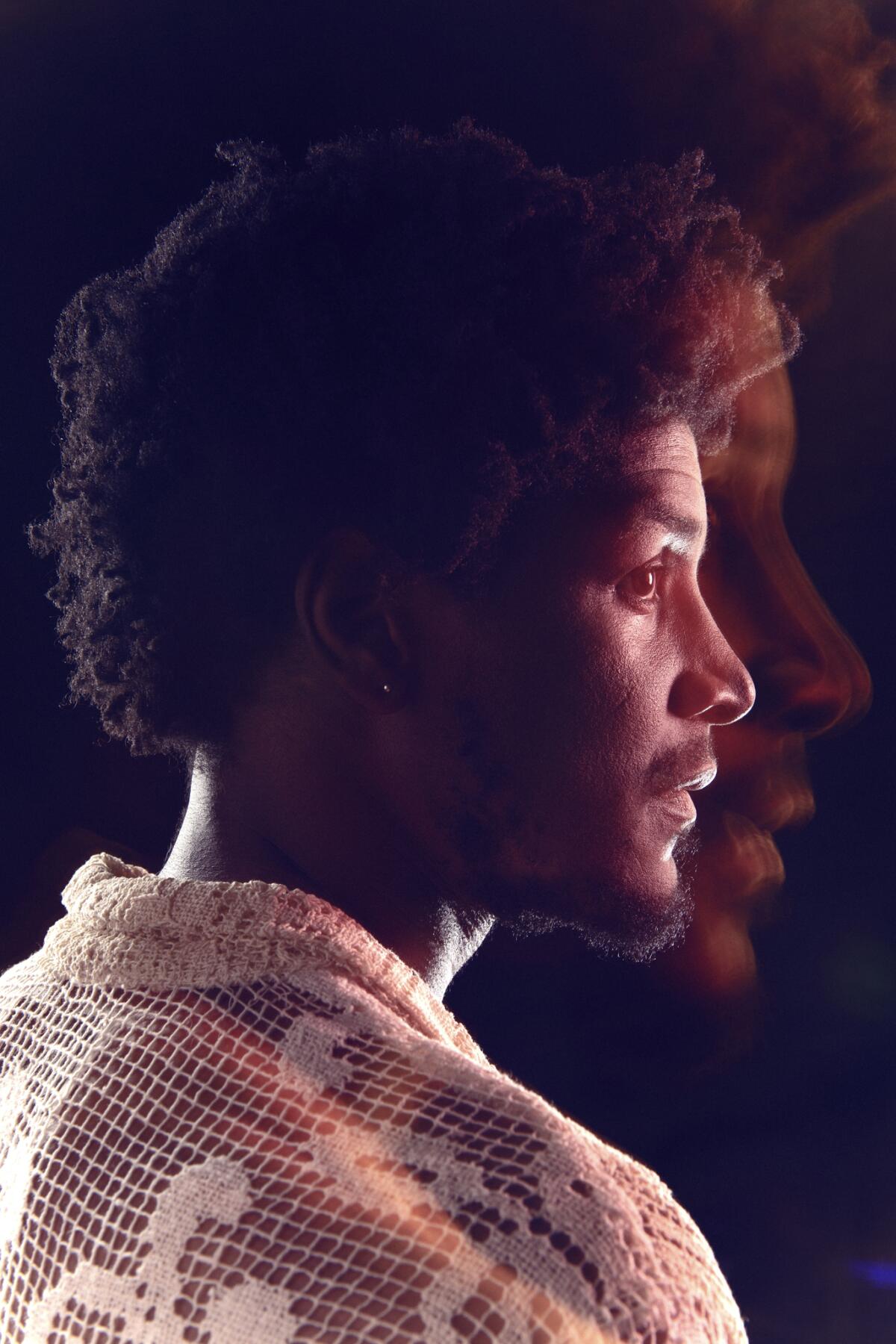
”Elliot’s Song,” this year’s second original music and lyrics nominee from “Euphoria,” is like a radio signal from space that recedes again into darkness. Its source, however, is from a hauntingly real place.
“Elliot’s saying, ‘I’m sorry [for betraying you], but I wanted to save you. I’m in hell, but I don’t want you in hell with me,’ ” says series composer Labrinth, who shares the nomination with star Zendaya (again) and with his frequent collaborator (and wife), Muzhda Zemar-McKenzie.
Zendaya explained to Labrinth her character, Rue, and Elliot (Dominic Fike) were thick as drugged-out thieves in the show’s second season. But along the way, Elliot betrays her twice: He sleeps with her girlfriend, Jules, and rats her out for resuming her addictive ways.
Labrinth sums up Elliot’s thinking on the latter, expressed in the song he writes for Rue: “ ‘If I’m going to lose you, I’d rather keep you alive than lose you by my side.’ Once Zendaya spoke to me about what he’d done, I heard in my head, ‘I’ve got no place / Buildin’ you a rocket up to outer space.’ ”
The lyric continues, “I watch you fade / Keepin’ the lights on in this forsaken place” and finishes each pair of stanzas with “I hope that it was worth it in the end.”
When Labrinth had only the first verse, he talked the song over with Zemar-McKenzie. She said it made her think of a very dear friend who died in an accident when she was 17.
“They were like peas in a pod,” said her husband. “They would get in trouble together. He always said to her, ‘I think I’m gonna go early.’ He would say it as a joke. And then he did end up going.”
Years later, “She had a dream about him saying, ‘Have you read my letter?’ After she had the dream, she learned from a mutual friend that he had left her a letter that she hadn’t previously known of.
“The letter was basically him saying, ‘I want you to have the best life. Don’t stay here; go and win.’ It was deep. It kind of makes me emotional speaking about it.
“He wasn’t planning on going, but in the letter it felt like him going was for her to become what she needed to become. We started writing in that perspective: ‘I know I may have upset you by abandoning you, but I hope you see that this becomes worth it in the end, to see you become what you need to become.’ ”
More to Read
From the Oscars to the Emmys.
Get the Envelope newsletter for exclusive awards season coverage, behind-the-scenes stories from the Envelope podcast and columnist Glenn Whipp’s must-read analysis.
You may occasionally receive promotional content from the Los Angeles Times.











